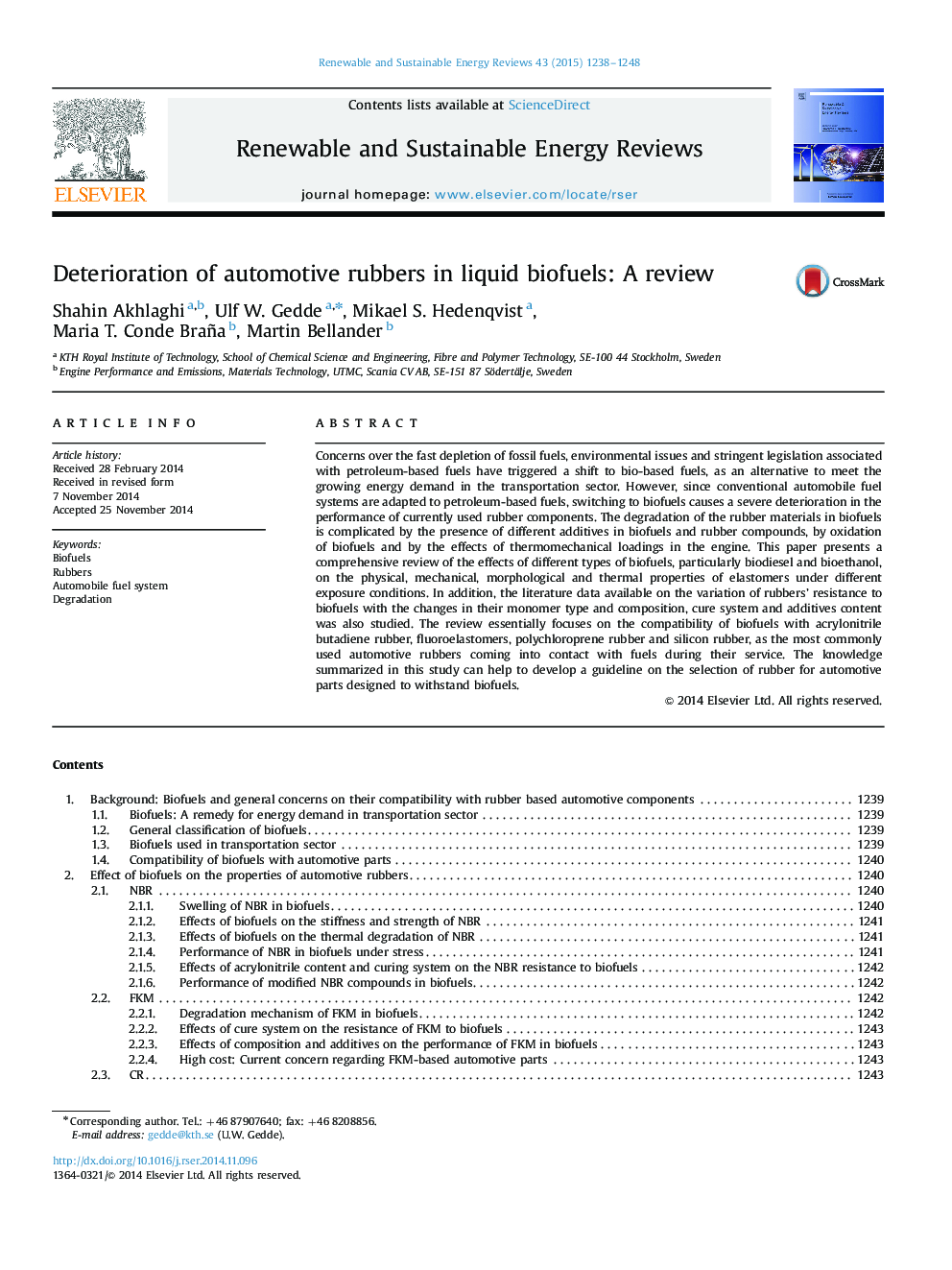| کد مقاله | کد نشریه | سال انتشار | مقاله انگلیسی | نسخه تمام متن |
|---|---|---|---|---|
| 8118286 | 1522342 | 2015 | 11 صفحه PDF | دانلود رایگان |
عنوان انگلیسی مقاله ISI
Deterioration of automotive rubbers in liquid biofuels: A review
ترجمه فارسی عنوان
کاهش راندمان خودرو در سوخت های مایع مایع: بررسی
دانلود مقاله + سفارش ترجمه
دانلود مقاله ISI انگلیسی
رایگان برای ایرانیان
کلمات کلیدی
سوخت های زیستی، رب سیستم سوخت خودرو تنزل،
ترجمه چکیده
نگرانی در مورد کاهش سریع سوخت های فسیلی، مسائل زیست محیطی و قوانین سختگیرانه مرتبط با سوخت های مبتنی بر نفت موجب تغییر به سوخت های زیستی شده است، به عنوان جایگزین برای رفع تقاضای انرژی در حال رشد در بخش حمل و نقل. با این حال، از آنجا که سیستم های سوخت خودرو معمولی با مواد سوختی مبتنی بر نفت سازگار هستند، تغییر به سوخت های زیستی منجر به خستگی شدید در عملکرد اجزای لاستیک مورد استفاده می شود. تخریب مواد لاستیکی در سوخت های زیستی با وجود افزودنی های مختلف در سوخت های زیستی و ترکیبات لاستیک، اکسیداسیون سوخت های زیستی و اثر لودرهای ترموموکانیکی در موتور پیچیده است. در این مقاله، بررسی جامع اثرات انواع مختلف سوخت های زیستی، بویژه بیودیزل و بیواتانول، بر خواص فیزیکی، مکانیکی، مورفولوژیکی و حرارتی الاستومر ها تحت شرایط مختلف قرار گرفتن، ارائه شده است. علاوه بر این، داده های ادبی موجود در مورد تغییر مقاومت در برابر ریزه های سوخت های زیستی با تغییرات در نوع و ترکیب مونومر، سیستم درمان و مواد افزودنی مورد مطالعه قرار گرفته است. این بررسی اساسا بر روی سازگاری سوخت های زیستی با اکریلنیتیلیل لاستیک بوتادین، فلوروآلستومرها، لاستیک پلی اکریلورپرونی و لاستیک سیلیکون متمرکز شده است، به عنوان لاستیک های معمولی مورد استفاده در خودرو در تماس با سوخت در طول خدمات خود. دانش خلاصه شده در این مطالعه می تواند کمک به توسعه یک راهنما در انتخاب لاستیک برای قطعات خودرو طراحی شده برای مقاومت در برابر سوخت های زیستی.
موضوعات مرتبط
مهندسی و علوم پایه
مهندسی انرژی
انرژی های تجدید پذیر، توسعه پایدار و محیط زیست
چکیده انگلیسی
Concerns over the fast depletion of fossil fuels, environmental issues and stringent legislation associated with petroleum-based fuels have triggered a shift to bio-based fuels, as an alternative to meet the growing energy demand in the transportation sector. However, since conventional automobile fuel systems are adapted to petroleum-based fuels, switching to biofuels causes a severe deterioration in the performance of currently used rubber components. The degradation of the rubber materials in biofuels is complicated by the presence of different additives in biofuels and rubber compounds, by oxidation of biofuels and by the effects of thermomechanical loadings in the engine. This paper presents a comprehensive review of the effects of different types of biofuels, particularly biodiesel and bioethanol, on the physical, mechanical, morphological and thermal properties of elastomers under different exposure conditions. In addition, the literature data available on the variation of rubbers' resistance to biofuels with the changes in their monomer type and composition, cure system and additives content was also studied. The review essentially focuses on the compatibility of biofuels with acrylonitrile butadiene rubber, fluoroelastomers, polychloroprene rubber and silicon rubber, as the most commonly used automotive rubbers coming into contact with fuels during their service. The knowledge summarized in this study can help to develop a guideline on the selection of rubber for automotive parts designed to withstand biofuels.
ناشر
Database: Elsevier - ScienceDirect (ساینس دایرکت)
Journal: Renewable and Sustainable Energy Reviews - Volume 43, March 2015, Pages 1238-1248
Journal: Renewable and Sustainable Energy Reviews - Volume 43, March 2015, Pages 1238-1248
نویسندگان
Shahin Akhlaghi, Ulf W. Gedde, Mikael S. Hedenqvist, Maria T. Conde Braña, Martin Bellander,
